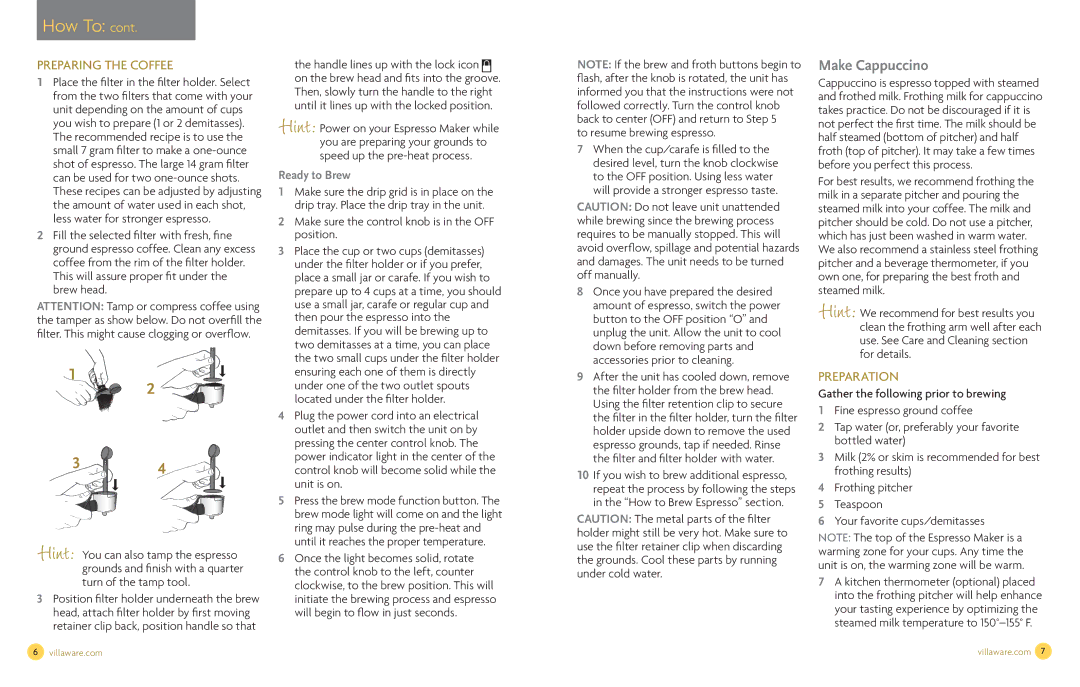How To: cont.
PREPARING THE COFFEE
1Place the filter in the filter holder. Select from the two filters that come with your unit depending on the amount of cups you wish to prepare (1 or 2 demitasses). The recommended recipe is to use the small 7 gram filter to make a one-ounce shot of espresso. The large 14 gram filter can be used for two one-ounce shots. These recipes can be adjusted by adjusting the amount of water used in each shot, less water for stronger espresso.
2Fill the selected filter with fresh, fine ground espresso coffee. Clean any excess coffee from the rim of the filter holder. This will assure proper fit under the brew head.
ATTENTION: Tamp or compress coffee using the tamper as show below. Do not overfill the filter. This might cause clogging or overflow.
1
Hint: You can also tamp the espresso grounds and finish with a quarter turn of the tamp tool.
3Position filter holder underneath the brew head, attach filter holder by first moving retainer clip back, position handle so that
the handle lines up with the lock icon
on the brew head and fits into the groove. Then, slowly turn the handle to the right until it lines up with the locked position.
Hint: Power on your Espresso Maker while you are preparing your grounds to speed up the pre-heat process.
Ready to Brew
1Make sure the drip grid is in place on the drip tray. Place the drip tray in the unit.
2Make sure the control knob is in the OFF position.
3Place the cup or two cups (demitasses) under the filter holder or if you prefer, place a small jar or carafe. If you wish to prepare up to 4 cups at a time, you should use a small jar, carafe or regular cup and then pour the espresso into the demitasses. If you will be brewing up to two demitasses at a time, you can place the two small cups under the filter holder ensuring each one of them is directly under one of the two outlet spouts located under the filter holder.
4Plug the power cord into an electrical outlet and then switch the unit on by pressing the center control knob. The power indicator light in the center of the control knob will become solid while the unit is on.
5Press the brew mode function button. The brew mode light will come on and the light ring may pulse during the pre-heat and until it reaches the proper temperature.
6Once the light becomes solid, rotate the control knob to the left, counter clockwise, to the brew position. This will initiate the brewing process and espresso will begin to flow in just seconds.
NOTE: If the brew and froth buttons begin to flash, after the knob is rotated, the unit has informed you that the instructions were not followed correctly. Turn the control knob back to center (OFF) and return to Step 5
to resume brewing espresso.
7When the cup/carafe is filled to the desired level, turn the knob clockwise to the OFF position. Using less water will provide a stronger espresso taste.
CAUTION: Do not leave unit unattended while brewing since the brewing process requires to be manually stopped. This will avoid overflow, spillage and potential hazards and damages. The unit needs to be turned off manually.
8Once you have prepared the desired amount of espresso, switch the power button to the OFF position “O” and unplug the unit. Allow the unit to cool down before removing parts and accessories prior to cleaning.
9After the unit has cooled down, remove the filter holder from the brew head. Using the filter retention clip to secure the filter in the filter holder, turn the filter holder upside down to remove the used espresso grounds, tap if needed. Rinse the filter and filter holder with water.
10If you wish to brew additional espresso, repeat the process by following the steps in the “How to Brew Espresso” section.
CAUTION: The metal parts of the filter holder might still be very hot. Make sure to use the filter retainer clip when discarding the grounds. Cool these parts by running under cold water.
Make Cappuccino
Cappuccino is espresso topped with steamed and frothed milk. Frothing milk for cappuccino takes practice. Do not be discouraged if it is not perfect the first time. The milk should be half steamed (bottom of pitcher) and half froth (top of pitcher). It may take a few times before you perfect this process.
For best results, we recommend frothing the milk in a separate pitcher and pouring the steamed milk into your coffee. The milk and pitcher should be cold. Do not use a pitcher, which has just been washed in warm water. We also recommend a stainless steel frothing pitcher and a beverage thermometer, if you own one, for preparing the best froth and steamed milk.
Hint: We recommend for best results you clean the frothing arm well after each use. See Care and Cleaning section for details.
PREPARATION
Gather the following prior to brewing
1Fine espresso ground coffee
2Tap water (or, preferably your favorite bottled water)
3Milk (2% or skim is recommended for best frothing results)
4Frothing pitcher
5Teaspoon
6Your favorite cups/demitasses
NOTE: The top of the Espresso Maker is a warming zone for your cups. Any time the unit is on, the warming zone will be warm.
7A kitchen thermometer (optional) placed into the frothing pitcher will help enhance your tasting experience by optimizing the steamed milk temperature to 150°–155° F.

